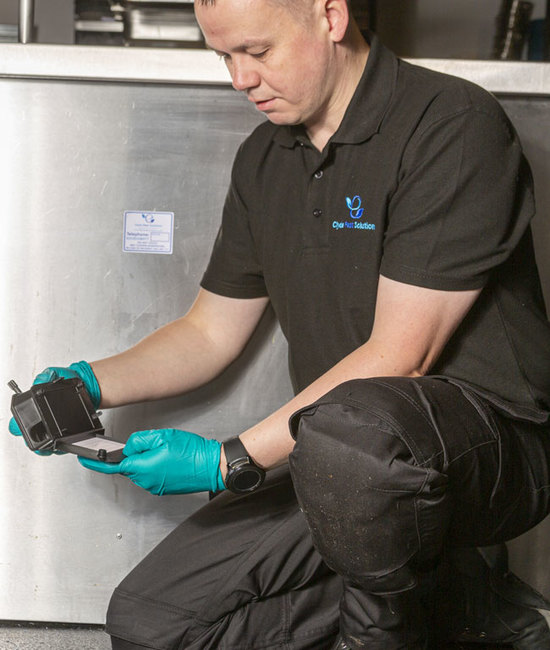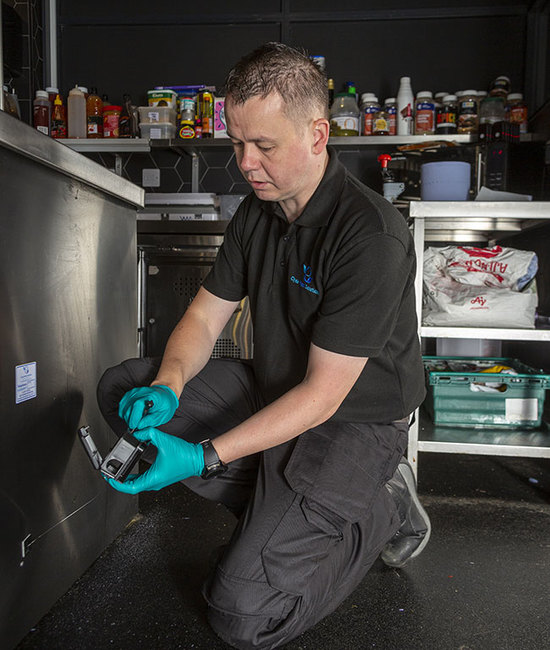Case Studies
Case Study | Pest Control Crisis in a Glasgow City Centre Restaurant
Introduction
A newly established restaurant in the heart of Glasgow city centre encountered a severe pest control crisis within its first three months of operation. This case study delves into the challenges, actions and consequences of the situation, offering insights and lessons for the food service industry.
Background
- Location: Glasgow City Centre, a bustling urban area
- Initial Operations: The restaurant commenced operations without engaging a pest control service, a decision that soon led to serious repercussions
Detailed Issue Analysis
- Initial Pest Reporting: The restaurant reached out to various Pest Management companies with Clyde Pest Solutions being successful in procuring the contract to address a mouse infestation. This was a crucial step as rodents can pose significant health risks and cause structural damage
- Escalating Infestation Problems: During the initial assessment a cockroach infestation was also discovered, further complicating the situation. Cockroaches can carry pathogens and are a major concern in food safety
Environmental Health Involvement
- Notices and Closure: The escalating pest issues drew the attention of environmental health authorities on a routine visit. The restaurant was served with multiple remedial action notices, culminating in a prohibition notice, which was close to being escalated to the procurator fiscal to charge the restaurant owners with food hygiene offences
- Public Health Concerns: The authorities' intervention underscored the severity of the health risks posed by the infestation


Comprehensive Pest Control Measures
- Cockroach Eradication Plan: Following the discovery of the cockroach infestation a robust four-week treatment plan was implemented, involving gel baiting and regular monitoring to ensure complete eradication
- Mouse Infestation Response: The treatment for the mouse infestation included the use of enhanced trapping, baiting & proofing measures. The mice had been damaging the building's fabric and compromising food packaging, necessitating immediate action
- Closure for Remediation: The restaurant had to cease trading for five days due to the Prohibition Notice to allow for through cleaning & to allow Clyde Pest Solutions to implement an Integrated Pest Management Plan to bring the infestation under control
Financial and Reputational Impacts
- Loss of Revenue: The temporary closure and the costs associated with pest control treatments resulted in a significant financial setback of approx. £26000 in lost trade.
- Reputational Damage: News of the pest infestation and the subsequent closure notice hit media & affected the restaurant's reputation, deterring potential customers and impacting long-term customer trust.
- Compliance and Trust Issues: The situation highlighted the deficiencies in food safety compliance, impacting the trust of customers and consequently increasing environmental health visits to ensure food safety and compliance.
Response and Recovery
- Reopening Strategies: Upon reopening, the restaurant implemented stringent food safety protocols to reassure customers.
- Marketing and Customer Engagement: Efforts were made to rebuild the restaurant's image through transparent communication and marketing strategies focused on their new, improved food safety standards.
- Ongoing Pest Control Measures: The restaurant established a regular pest control and monitoring program to prevent future infestations.
Lessons and Recommendations
- Proactive Pest Management: The importance of proactive pest control in the food service industry cannot be overstated.
- Building a Compliance Culture: Ensuring adherence to Food safety regulations is vital for maintaining operational integrity and customer confidence.
- Crisis Management and Transparency: Effective crisis management, coupled with transparent communication with all, is key in navigating such scenarios.
Conclusion
This case study serves as an important lesson for the food service industry. It underscores the necessity of proactive pest control measures, regular pest management inspections and strict adherence to food safety law to ensure the well-being of customers and the sustainability of the business. The experience of this Glasgow city centre restaurant is a reminder of the consequences of neglecting these crucial aspects of food service management.
